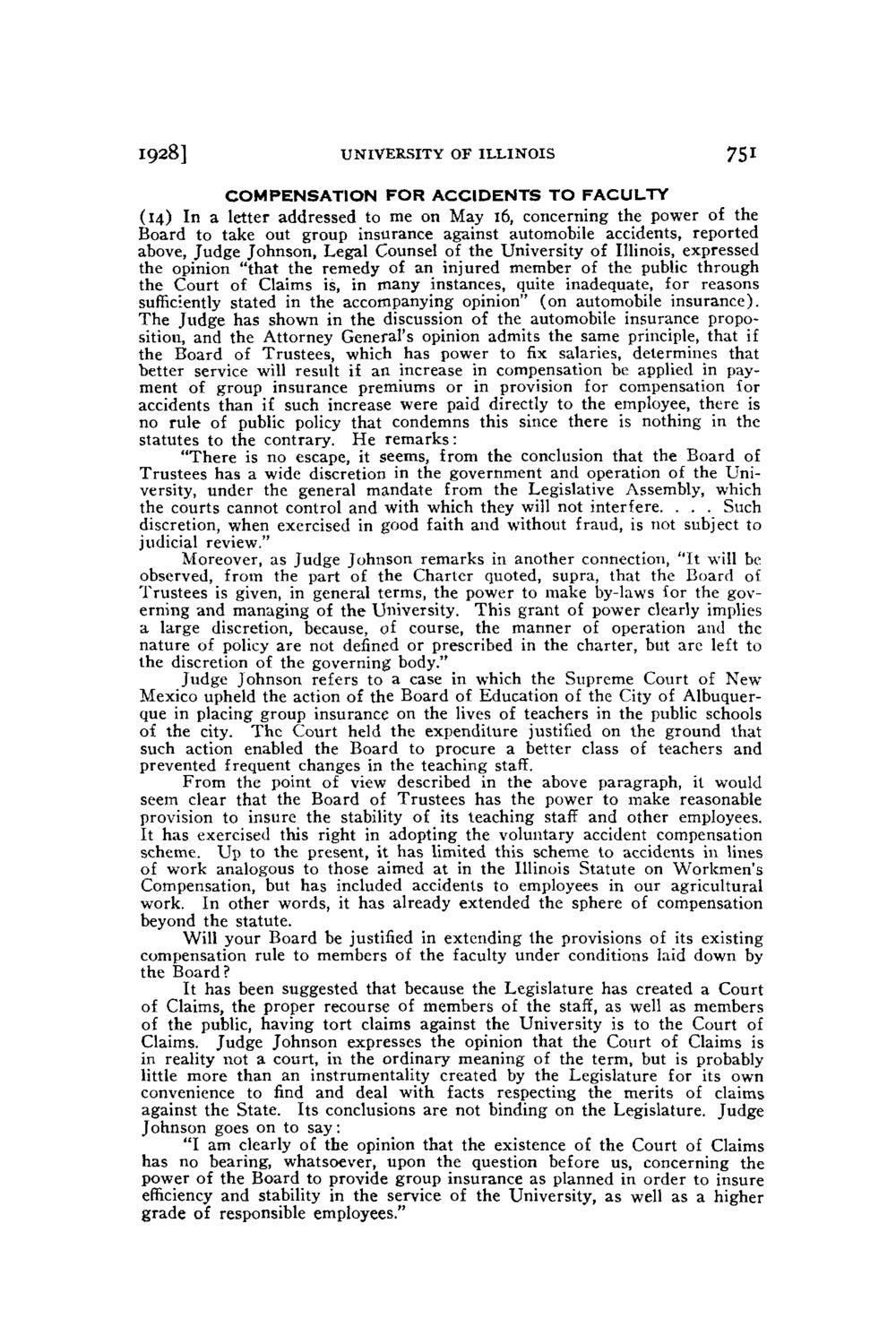| |
| |
Caption: Board of Trustees Minutes - 1928
This is a reduced-resolution page image for fast online browsing.

EXTRACTED TEXT FROM PAGE:
1928] UNIVERSITY OF ILLINOIS 751 COMPENSATION FOR ACCIDENTS TO FACULTY (14) In a letter addressed to m e on M a y 16, concerning the power of the Board to take out group insurance against automobile accidents, reported above, Judge Johnson, Legal Counsel of the University of Illinois, expressed the opinion "that the remedy of an injured member of the public through the Court of Claims is, in m a n y instances, quite inadequate, for reasons sufficiently stated in the accompanying opinion" (on automobile insurance). The Judge has shown in the discussion of the automobile insurance proposition, and the Attorney General's opinion admits the same principle, that if the Board of Trustees, which has power to fix salaries, determines that better service will result if an increase in compensation be applied in payment of group insurance premiums or in provision for compensation for accidents than if such increase were paid directly to the employee, there is no rule of public policy that condemns this since there is nothing in the statutes to the contrary. H e remarks: "There is no escape, it seems, from the conclusion that the Board of Trustees has a wide discretion in the government and operation of the University, under the general mandate from the Legislative Assembly, which the courts cannot control and with which they will not interfere. . . . Such discretion, when exercised in good faith and without fraud, is not subject to judicial review." Moreover, as Judge Johnson remarks in another connection, "It will be observed, from the part of the Charter quoted, supra, that the Board of Trustees is given, in general terms, the power to make by-laws for the governing and managing of the University. This grant of power clearly implies a large discretion, because, of course, the manner of operation and the nature of policy are not defined or prescribed in the charter, but are left to the discretion of the governing body." Judge Johnson refers to a case in which the Supreme Court of N e w Mexico upheld the action of the Board of Education of the City of Albuquerque in placing group insurance on the lives of teachers in the public schools of the city. T h e Court held the expenditure justified on the ground that such action enabled the Board to procure a better class of teachers and prevented frequent changes in the teaching staff. F r o m the point of view described in the above paragraph, it would seem clear that the Board of Trustees has the power to make reasonable provision to insure the stability of its teaching staff and other employees. It has exercised this right in adopting the voluntary accident compensation scheme. U p to the present, it has limited this scheme to accidents in lines of work analogous to those aimed at in the Illinois Statute on Workmen's Compensation, but has included accidents to employees in our agricultural work. In other words, it has already extended the sphere of compensation beyond the statute. Will your Board be justified in extending the provisions of its existing compensation rule to members of the faculty under conditions laid d o w n by the Board? It has been suggested that because the Legislature has created a Court of Claims, the proper recourse of members of the staff, as well as members of the public, having tort claims against the University is to the Court of Claims. Judge Johnson expresses the opinion that the Court of Claims is in reality not a court, in the ordinary meaning of the term, but is probably little more than an instrumentality created by the Legislature for its o w n convenience to find and deal with facts respecting the merits of claims against the State. Its conclusions are not binding on the Legislature. Judge Johnson goes on to say: power ofa m clearly of the the uponthat the existence of thein orderof Claims grade"I bearing, whatsoever, groupthe question plannedus, concerning the has noof responsibleto provideservice insurance as before as well as to higher efficiency the Board employees." and stability in opinion of the University, Court a insure
| |